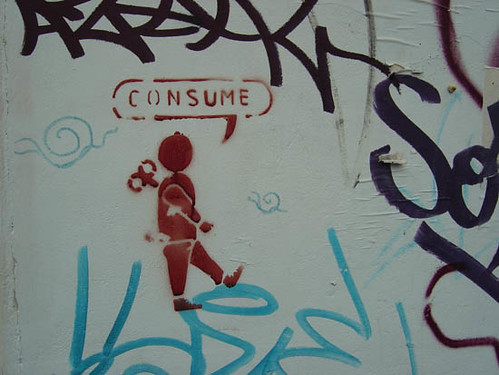In their responses for Blog Post #7, Daniel, Sneezy Deezy, Lakisha, and Alex all take up issues related to how we produce ourselves and our culture through the consumption of objects. For example, Daniel muses about how post-modern consumerism may contribute to the construction of an extended, but ultimately alienated self:
Here, I reach the crossroads: Belk and Marx present related, but contrasting points of view- does having enhance or alienate the self? I tend to think it’s a paradox– both things are happening in real time– the multifaceted existential concepts of self (Sartre via Kinneavy) could, at once, be at odds with one another within the individual, creating a sense of an enlarged and alienated self.
Sneezy Deezy explores how desires created by the marketplace may be feeding (pun intended) our unhealthy obsession with food. It’s an obsession unhealthy not only because it might make us physically sick, but also because it may distract us from significant intellectual work:
Do you think that Americans are obsessed with food? If so, where do you think this tendency to place our emotions on our eating habits comes into play? Is this why obesity and other health problems are an issue? Society focuses so strongly on food that people are becoming famous for their eating habits, or their food creations. For instance, The Guy who Survived on Pizza for 25 Years , now has his own documentary and is famous for having a complete obsession with pizza–his fridge is stocked full with the item–he only eats cheese pizza and claims to never eat pizza. Surprisingly, this so-called “Pizza King” is still healthy, according to his doctor, but is his obsession with one food? The main existence of food is to provide sustenance. What else does it provide and is this a beneficial thing or is it detrimental?

Where Daniel and Sneezy Deezy take a look at how modern or post-modern consumption practices may be contributing to social alienation and mental and physical deterioration, Lakisha and Alex take an interest in how consumption of objects may actually help us form personal and cultural bonds that sustain individuals and strengthen societies. As Lakisha observes, baby carriers not only make it easier for mothers to return to the labor of everyday life while caring for an infant, they can also promote bonding between mother and child by encouraging physical closeness between them. In thinking about how objects help forge connections between individuals and their culture–as well as between individuals and their families–Alex argues that cultural heritage objects function as aids to remembrance and communication of the cherished social experiences and learning processes from which they emerged.

Taken together, these four blog posts seem to suggest that, although consumption of objects–food, tools, art, etc.–is essential to human existence, satisfying our need for things can involve costs as well as benefits. What are some of those costs and benefits? How do you balance those costs and benefits in your own habits of consumption? What personal experience have you had that might help to illuminate the risks and rewards of our desire for things?
Carefully read or re-read the posts by Daniel, Sneezy Deezy, Alex, and Lakisha. Use those posts and some of the resources to which they link and cite as a starting point for some careful examination of your own consumption practices. Have you ever had to make a purchasing decision in which convenience or personal preference suggested one course of action, and the “greater good” weighed in favor of another? What is the most significant purchase or use of an object you’ve ever made, and why was it so important? How do you see the costs and benefits discussed in these four posts and their sources playing out in your own consumption practices?
Posting: Group 1
Commenting: Group 2
Category: Wanting Things
In your Blog #8 post, you should do more than offer a list of answers to these questions. Rather, you should frame your post around the description of a central experience or practice from your own life, and an examination of what that experience demonstrates about the relevance of consumption to you as an individual and perhaps culture or society more broadly. Please carefully read and follow the guidelines and posting information for this blog as they’ve been outlined in the Blog Project Description.
Feature Image: “CONSUMED” by Mark Colliton on Flickr.

